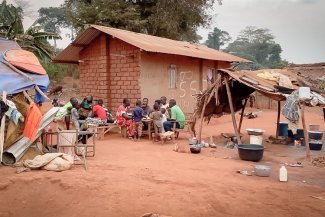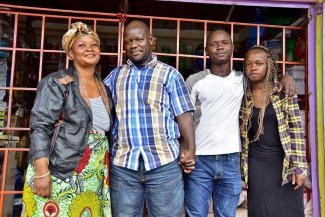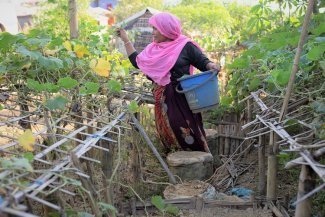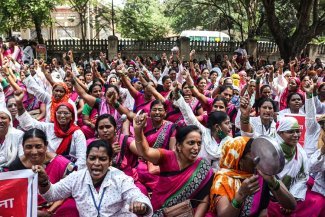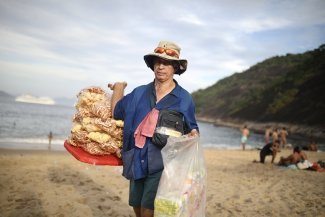

Fleeing the atrocities of the jihadists in the Cabo Delgado region, a Mozambican mother, Chrissy Ngundumu, found refuge with her family in a village in southern Malawi on 2 March 2022.
Nassim’s red 125cc motorbike races down a narrow dirt track. The driver knows this small road that connects Chiponde, in Malawi, and Mandimba, in Mozambique, like the back of his hand. He shuttles between the two border posts at least eight times a day. “Most of the people near this border are Mozambicans fleeing the war,” says the motorbike taxi driver, between two return trips.
Since the onset of the conflicts in northern Mozambique, this border has been the main crossing point for civilians leaving their country for Malawi. Fleeing the fighting, a family of 17 passed through here on 23 December 2021 and went on to find refuge in the small village of Matiti, some ten kilometres from the border.
Originally from the Lichinga district, they fled the fighting that had spread from the north-eastern Cabo Delgado province to the west of the country. Since October 2017, this conflict has pitted jihadist insurgents from the Ansar al-Sunnah movement, locally known as Al-Shabab, against the Mozambican government. The insurgents want to enforce Sharia, or Islamic law. Its members reject the authority of the state, schools and the health system. According to humanitarian organisations, at least 3,500 people have been killed, 600 women kidnapped and 800,000 people displaced since the beginning of the conflict. The testimony gathered also bears witness to beheadings, sex crimes and all manner of abuses.
“What I’ve seen is horrifying”
The eldest member of the family, 86-year-old Namanya Anderson, explains that the conflict in their home region left them with no choice but to leave. With several young children to look after, the family could think of nothing else. “Al-Shabab fighters were cutting off people’s heads for no reason in nearby villages. Such butchery was being committed just five or ten kilometres from our home, so we had to leave,” says the greying grandfather of several children.
Chrissy Ngundumu, wearing a blue tunic and jewellery, says she narrowly escaped rape. “What I saw was horrifying,” she says. “The fighters tore off the women’s clothes and made them run naked on the street.” Carrying her youngest daughter, wrapped in a cloth, on her back, she explains that none of her eight children or four grandchildren will return to Mozambique. She sincerely hopes they will be schooled in Malawi, although it is not currently possible, without identity papers.
A little further on, a young couple from the same family recounts their journey, an incredible exodus. Aeness Awali, a 24-year-old Mozambican woman, tells of the countless means of transport they had to take and the lack of food.
“The children were screaming all the time because they were hungry. People were laughing and poking fun at us on the way,” says the young mother, with a stern look on her face.
Her husband, January Anderson, a farmer, had refused to take up arms against the insurgents. “I don’t know how to use a weapon. I’m doing whatever I can now to help on this farm,” he says, pointing to a maize field. No one in this family thinks that the tensions in Cabo Delgado are likely to ease. Pending their regularisation in Malawi, they were able to obtain “war refugee” status at the Chiponde border post.
There is next to no official record of the number of Mozambicans in the country today (according to UNHCR data for 2022, there are 86,427 refugees in Malawi). “The ability to keep a census is very limited,” explains Régio Conrado, a political science doctoral student and lecturer at Sciences Po Bordeaux. “In the case of refugees in Malawi, the situation is generally overlooked because, since the war, Malawi has grown accustomed to refugees.”
During the civil war that ravaged Mozambique between 1977 and 1992, people headed for Malawi in their hundreds of thousands. Still today, crossing the porous border between the two countries remains one of the best ways to flee the atrocities in Cabo Delgado.
As Éric Morier-Genoud, a historian specialising in Mozambique, explains, these refugees can no longer go to Tanzania, which lies to the north of Mozambique. “They are caught by the government and put on buses back to Mozambique,” he says. Since the Tanzanian government’s ban on Mozambican refugees, most now seek refuge in Malawi. “A number of large camps are likely to emerge in the months to come,” says the historian.
Guerrilla warfare and child soldiers
Cabo Delgado province, one of the poorest in Mozambique, has a population of 2.3 million inhabitants, 58 per cent of whom are Muslim. The jihadists recruit many fighters in this area, where there is a strong sense of marginalisation among the local population. The Al-Shabab movement at the root of the atrocities became militarised in Mozambique in 2016. The insurgency began in earnest in 2017 and gradually shifted to guerrilla warfare.
In June 2019, the Islamic State claimed responsibility for its first attacks in Mozambique. A month later, Al-Shabab pledged allegiance to Islamic State (IS). On 24 March 2021, the jihadist assault and capture of the port of Palma claimed the lives of 55 people and weakened the troops of Mozambique’s president, Filipe Nyusi. More recently, on 16 March 2022, the insurgents claimed responsibility for an attack on Matemo Island in the east of the country, in which seven soldiers were killed.
Over the past few months, the jihadists have been retreating to the forests of Cabo Delgado and Mecula – areas they know well – where they can train hundreds of child soldiers in training camps.
“One of the precepts of jihadism is that, after puberty, a teenager can take part in combat and take up arms,” says Wassim Nasr, a specialist in jihadist movements. The continued fighting is preventing Mozambican civilians from returning to their homes for several reasons. The first is that they cannot return while the insurgents are still terrorising the population. The second, as Nasr explains, “is that if they were to return, some civilians would be regarded as jihadists by the Mozambican government”.
In July 2021, following the escalation in the insurgency, the government signed a bilateral agreement with Rwanda under which Kigali confirmed that it would send 1,000 Rwandan soldiers to Cabo Delgado province to fight against the jihadists. They have been deployed in the districts of Palma and Mocimboa de Praia. This foreign intervention serves to strengthen the position of Rwanda’s President Paul Kagame in southern Africa. Despite giving the impression that he has the situation under control, the fighting nonetheless remains ongoing. According to Conrado, the Sciences Po lecturer, Rwanda is “looking to sell its model in southern Africa. The aim is to eliminate external dangers in the region and to expand politically,” says the specialist, who was on the ground in Cabo Delgado in 2021.
Economic interests
Another reason for Rwanda’s presence in Cabo Delgado is the wealth of the subsoil in the region, home to one of the world’s largest gas reserves, highly coveted by global energy giants such as Italy’s ENI or US corporation Exxon. On 24 March 2021, following the terrorist attack on the city of Palma, French group TotalEnergies suspended its largest project to date. Since the military intervention in the region, plans have been made to resume drilling and production is scheduled to begin in 2026.
“Recapturing coastal cities, such as Palma, from the jihadists enables the foreign investors to proceed with what they had started,” explains Thierry Vircoulon, coordinator of the Central and Southern Africa Observatory of the French Institute for International Relations (IFRI). “It is an offshore gas project but it nonetheless requires a secure coast.” The return of foreign capital does not bode well for the civilian populations who have fled the terrorist threat. “The risk is that islands of security will emerge around gas projects, with guerrilla warfare continuing around them,” warns Morier-Genoud, the historian specialised in Mozambique.
Malawi, while hosting the refugees, is not involved in the military effort in Cabo Delgado. “It is a microstate with a very small army and limited security capabilities,” says Vircoulon. “The best it can do is to control the borders because the jihadists are capable of crossing them.” The risk of the Islamist insurgency spreading is real, according to Morier-Genoud: “A few years ago, the sectarian movements that instigated the insurgency were also influential in the Nampula and Niassa regions, up to the border with Malawi.”
In front of their refuge in Malawi, Namanya Anderson and his family have set up a small pot on a stove. “That’s why the others aren’t here,” says the family elder. “They’ve gone to do some little jobs, to be able to buy food.” Sitting cross-legged, he calmly observes the children playing in the yard. Despite the difficult living conditions, he is conscious of what he has saved by leaving Lichinga.



